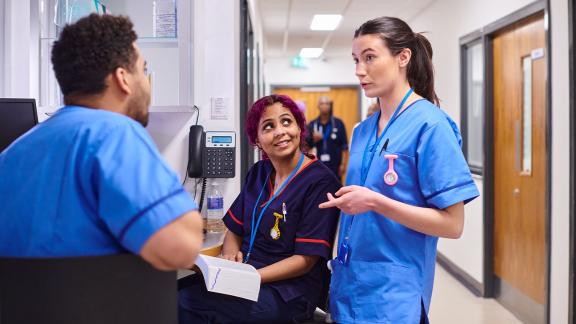Making an impact: the SAS advocate at Sheffield Children's Trust

Overview
Sheffield Children’s NHS Foundation Trust recognised that many of its specialty, associate and specialist (SAS) doctors faced workplace challenges, including bullying, lack of recognition, and wellbeing concerns.
In 2022, the trust aimed to improve the experience and wellbeing of SAS doctors by creating the advocate position. This led to an increase in understanding of SAS roles and a better working atmosphere. The advocate role supports Sheffield Children’s commitment to compassionate leadership, inclusive culture, and being a great place to work and train.
Key benefits and outcomes
The 2024 SAS staff survey found the following:
- Bullying and harassment was reduced from 30 per cent in 2023 to 9 per cent in 2024.
- 82 per cent worked autonomously compared to 55 per cent in 2023.
- 68 per cent feel valued in their role compared to only 33 per cent feeling SAS was a positive career option in 2023.
- Bringing SAS together and having a point of contact to raise issues.
What the organisation faced
When the SAS advocate role was created as part of the 2021 SAS contract reform, the trust wasn’t sure it was needed. Weeks after the contract launch, it became clear the organisation’s SAS doctors needed stronger representation. The trust was committed to raising the profile of this group of doctors and ensuring they received the recognition they deserve for the valuable contributions they make to the organisation.
Reports of bullying and harassment had surfaced, but staff were unsure how to raise them safely. SAS doctors work across multiple departments and sites, which can lead to feelings of isolation. The SAS advocate role was introduced to provide a unifying link, creating opportunities for connection, shared dialogue, and a platform to raise and address common issues.
Understanding that SAS doctors are more likely to be international medical recruits, the trust identified the need for a strong advocate to support and unify this part of the workforce.
What the organisation did
Sheffield Children’s recruited a specialty doctor in paediatric gastroenterology to the post of SAS advocate, who had been at the trust a number of years. Having experienced some of these challenges firsthand, the SAS advocate brought valuable insight and understanding, which helped in identifying meaningful solutions.
Once recruited, HR won support from clinical leads and the medical director using staff survey results and anecdotes from SAS doctors. The staff survey results, and other SAS specific surveys ensure the organisation has a clear picture of the SAS experience at the trust. Sharon Fernandes-Kore, medical HR business partner, said:
“We emphasised the unique role an advocate could play in representing SAS doctors’ interests and improving their experience. Our medical director was very supportive and, after reviewing the business case highlighting the value the role would add, agreed to proceed.”
Working with the SAS tutor, the advocate created a WhatsApp group and organises social events, valued especially by colleagues working off-site or in isolation. The trust celebrates SAS Week with Q&A sessions, survey feedback, and communications across the organisation to raise awareness of SAS roles. This year’s celebration will conclude with a shared meal, providing an opportunity for SAS doctors to socialise and connect with one another.
The SAS advocate and tutor also hold regular meetings with the medical HR business partner to discuss and appropriately address any arising issues. In addition, having direct access to the medical director has proven valuable for escalating concerns and ensuring they are handled effectively.
The advocate also gathers regular anecdotal feedback from colleagues via email to improve and provide evidence of challenges they face as well as insights to best practice. SAS colleagues highlight the importance of knowing they aren’t alone. The trust also addresses microaggressions through dedicated training, including a presentation and toolkit now embedded in ongoing learning.
The annual trust SAS education days include HR-led sessions that reinforce the trust’s zero-tolerance approach to bullying and harassment, with strong backing from the medical director. To strengthen their impact, the SAS advocate also connects with peers through a national WhatsApp group, sharing best practice and support in the advocacy role.
Results and benefits
The advocate role has amplified the visibility of SAS doctors, providing more awareness and understanding of their work and responsibilities. Colleagues now actively engage with the SAS advocate and seek to learn more.
The role has modelled compassionate leadership and created psychologically safe spaces where colleagues feel respected, valued, and supported to speak up. The increased visibility and voice of SAS colleagues has strengthened inclusion across clinical teams and contributed to a fairer, more equitable culture.
This has played a key role in reducing incidents of bullying and increasing the sense of value reported in SAS staff surveys.
Following feedback in 2024, around career progression for SAS doctors, the trust has created a specialist role and hopes that more roles can be created in the future.
“Raising awareness of their roles, responsibilities, and career pathways has been a key focus of our advocacy work. This has helped improve recognition, respect, and inclusion for SAS doctors within clinical teams and leadership forums.”
Dr Sunita Rajani Specialty Doctor in Paediatric Gastroenterology and SAS Advocate.
Overcoming obstacles
Securing funding was a key challenge when setting up the advocate role. As well as questions such as why a SAS advocate was needed when there was already a Freedom to Speak Up Guardian. The business case framed the role as a wellbeing initiative rather than a financial ROI, supporting the trust’s aim to be a brilliant place to work.
The SAS WhatsApp group, created by the SAS advocate, has improved engagement among SAS doctors. New doctors are welcomed early through collaboration between the SAS tutor, HR, and advocate, supported by regular activities that foster connection and community.
Awareness of the advocate role has grown through increased visibility, representation in leadership forums, and consistent communication. Support from the medical director’s office and joint efforts with communications - especially during SAS Week - have been central to raising the profile of SAS colleagues and highlighting their contributions across the organisation.
Take-away tips
If you are considering recruiting an advocate in your trust, here are some tips to get you started:
- Use data from the staff survey and gather feedback from SAS representatives on departmental and board meetings.
- Talk to your SAS workforce to understand their concerns or expectations.
- Speak to the relevant clinical and medical leads to gather support and to identify any concerns.
- Identify senior leadership supporters. Culture change begins at the top, so buy in from your executive team is essential.
- Research trusts that already employ to the role and contact for advice.
- Read useful guidance that is available like the NHS Employers guide to the advocate role and the SAS advocate guidance.
Further information
For further information contact Sheffield Children’s NHS Foundation Trust:
- Sharon Fernandes-Kore, Medical HR Business Partner Email Sharon Fernandes-Kore
- Dr Sunita Rajani, Specialty Doctor in Paediatric Gastroenterology and SAS Advocate Email Sunita Rajani



